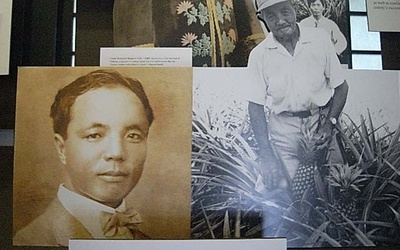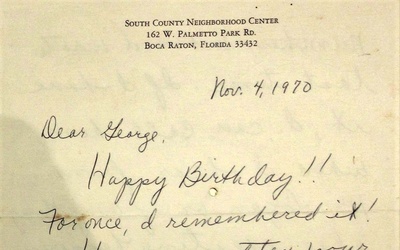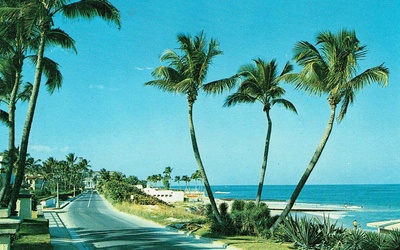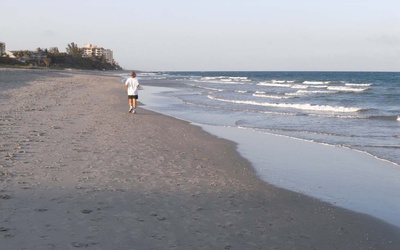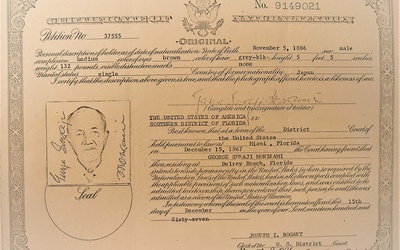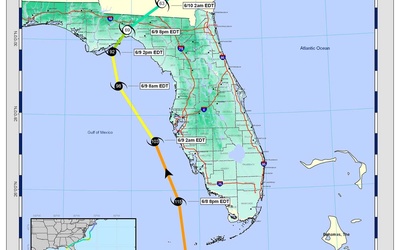A lonely longing for home - From the letters of Morikami Suketsugu, a Japanese immigrant in Florida
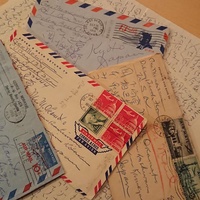
In the early 20th century, the Japanese village of Yamato Colony appeared in southern Florida. Morikami Sukeji (George Morikami), who immigrated from Miyazu, Kyoto City as a farmer and pioneer, is the man who laid the foundation for the Morikami Museum and Japanese Gardens, which is now located in Florida. He stayed on after the colony was dissolved and disappeared before the war, and continued farming alone through the war. He ended up donating a huge amount of land, leaving his name in the local area. He remained single throughout his life and never returned to Japan, but he was more homesick than most and continued to write letters to Japan. He corresponded frequently with the Okamoto family, including the wife and daughters of his late brother. Although he never met them, he treated them like family and sent them information about the situation and his thoughts in the area. The letters he left behind trace his life and lonely homesickness as a record of one generation.
Stories from this series
Episode 30: My younger brother died and I was left alone
April 10, 2020 • Ryusuke Kawai
Morikami Sukeji, who traveled to America as a member of the Yamato Colony in South Florida and remained there alone until the end of his life after the colony was disbanded, continued to write letters to his sister-in-law and her family, who had lost her husband (Sukeji's younger brother) after the war. In 1970, the weather was bad and crops were severely affected. The departure of his niece, who he had planned to bring over, became uncertain, and he received …
#29 Excited about my niece's plans to go to the US
March 27, 2020 • Ryusuke Kawai
Morikami Sukeji, who came to America as a member of the Yamato Colony in South Florida and remained there alone until the end of his life after the colony was dissolved, continues to write letters to his sister-in-law and her family, who lost her husband (Sukeji's younger brother) after the war. In 1970, he gazes upon the success of Japan's World Expo from afar and recounts his memories of the time he spent in Kyogoku, Kyoto, before going to America. …
#28: Hundreds of correspondence so far
March 13, 2020 • Ryusuke Kawai
Morikami Sukeji, who came to America as a member of the Yamato Colony in South Florida and remained there alone until the end of his life after the colony was dissolved, continues to write letters to his sister-in-law and her family, who lost her husband (Sukeji's younger brother) after the war. Perhaps because he has been living in America for so long, he has stopped reading the Japanese books he had wanted to read. He often fails at farming and …
No. 27: Life without dreams is meaningless
Feb. 28, 2020 • Ryusuke Kawai
Morikami Sukeji, who traveled to America as a member of the Yamato Colony in South Florida and remained there alone until the end of his life after the colony was disbanded, continued to write letters to his sister-in-law and her family, whose husband (Sukeji's younger brother) had died after the war. He reports that in 1968 he was living a settled life, close to nature, as if he had been able to let go of something after becoming an American …
26th: Naturalized in the United States and became a U.S. citizen
Feb. 14, 2020 • Ryusuke Kawai
Morikami Sukeji came to America as a member of the Yamato Colony in South Florida, and remained there alone until the end of his life after the colony was disbanded. After the war, he continued to write letters to his sister-in-law and her family, whose husband (Sukeji's younger brother) had died. At the end of 1967, Sukeji gained American citizenship. He had been considering whether to return to Japan, but at this point he was overjoyed that his long-cherished wish …
No. 25 I'm 80, and there are so many things I want to do
Jan. 24, 2020 • Ryusuke Kawai
Morikami Sukeji came to America as a member of the Yamato Colony in South Florida, and remained there alone until the end of his life after the colony was disbanded. After the war, he continued to write letters to his sister-in-law and her family, who had lost her husband (Sukeji's younger brother). In 1966, Florida was hit by Hurricane Alma, causing great damage to crops. That autumn, Sukeji turned 80 and had been in America for 60 years. He says …

